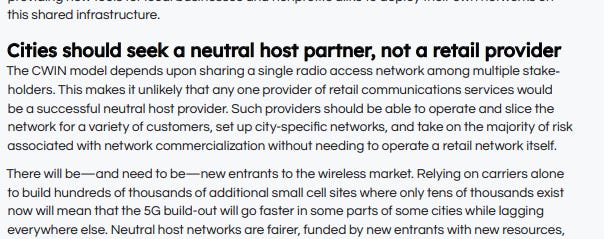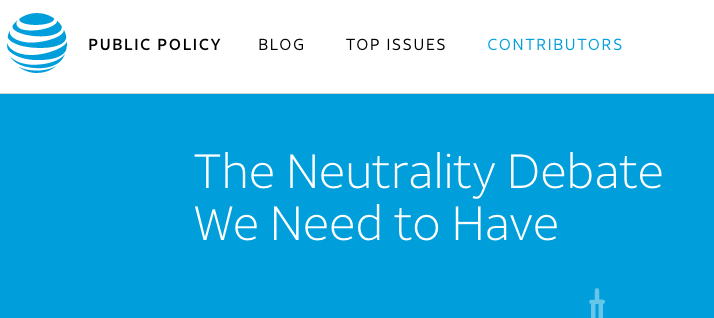Google ex-CEO Eric Schmidt Calls for Full Communism
Don’t trust bust me, don’t trust bust thee, attack the monopoly behind the tree.
Welcome to BIG, a newsletter on the politics of monopoly power. If you’d like to sign up to receive issues over email, you can do so here.
You wouldn’t think it, but this white paper and its super boring title - “Community-Centered Wireless Infrastructure Networks” - is a declaration of war by Google against big telecom.
Why is that? Well, Google and Eric Schmidt are running a campaign to lobby cities to have them own and control their own broadband system, instead of the way it works now, where they allow AT&T, Verizon, or T-Mobile to do so.
Most people think that telecom is regulated by the Federal Communications Commission, but cities actually have a significant role in telecom deployment, because you have to attach equipment to all sorts of municipal infrastructure and it is muni governments that oversee such activities. In fact, cities were the first telephone regulators in the late 19th century, and had significant authority all the way until the Telecom Act of 1996, spurred by merchants who demanded that cities regulate telephones so there wouldn’t be wires strung all over the city streets from competing phone networks.
It’s now back to the future. Schmidt, along with a host of philanthropists and tech money, is saying that cities should work with a ‘neutral host partner,’ aka a public utility, when rolling out 5G services, not a ‘retail provider,’ which would be your standard telecom. In other words, cities should run the infrastructure. All hail Comrade Schmidt and his call for public agencies to own the means of production.
In truth, Schmidt just wants cities to open up the wireless market for competition so big tech firms can enter the game by underpricing telecom service. In doing so, he is engaging a direct strike at the business model of retail telecom players. It’s a return shot at telecom firms, who have been going after Google for the last few years in various ways. Here’s AT&T, for instance, calling for reform of Section 230 of the Communications Decency Act, the law underpinning Google’s business model
In comments this Wednesday, AT&T will join the growing consensus of voices concluding that online platforms should be more accountable for, and more transparent about, the decisions they control that fundamentally shape how we communicate, learn, shop, and are informed and entertained. We argue first that the dominant online platforms owe the public greater transparency about the choices made on their platforms. Such transparency is considered table stakes in every discussion about broadband networks owned by ISPs.
Google and big telecom have been going at it since the late 2000s, when Google backed net neutrality to block the desire of AT&T to create physical wireline chokeholds over internet services. The battle is only getting more intense, and both sides are actually pushing for the public interest, but only when it comes to their opponent.
One of the most fun parts of being part of the anti-monopoly movement is that you get to root for the monopolist who suddenly becomes anti-monopolist when his interests are threatened. Wheee!
Don’t trust bust me, don’t trust bust thee, attack the monopoly behind the tree.





Don't believe? Try posting any of of these comments on facebook or twitter
This is just another way to capture user information. The mobile network operators are capturing usage activity, tying it very precisely to location. I'm convinced they're making a killing on this data. Google wants to bump them out of the way, and enter the market, and capture it directly, expanding their reach even further, and becoming even more of an advertising monopoly in the process.